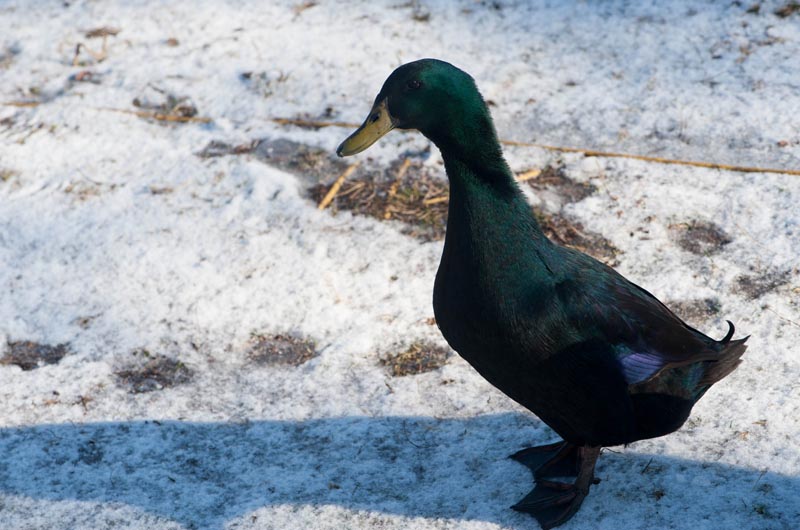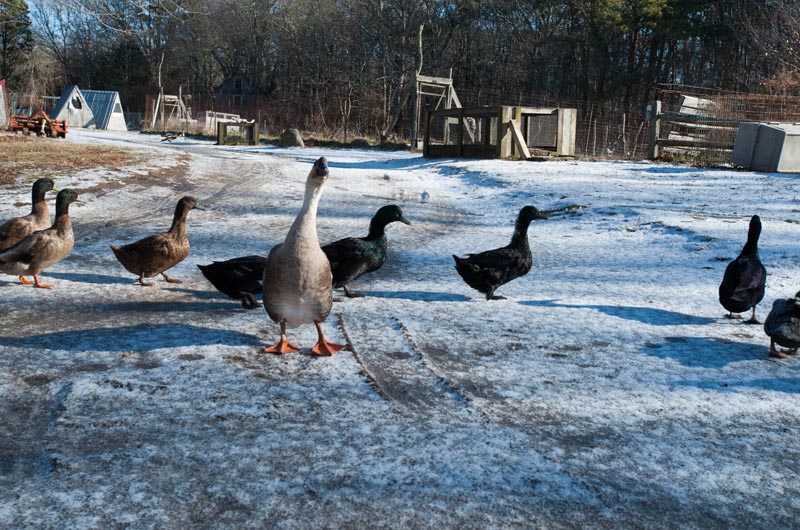In order to save the duck, one must eat the duck.
It may seem counterintuitive, but that’s the idea behind Rebecca Gilbert’s latest venture at the Native Earth Teaching Farm in Chilmark. Ms. Gilbert is starting a Cayuga duck community supported agriculture (CSA) program early next year in an effort to help bring back the rare breed.
“It’s consuming them that actually makes it possible for them to continue,” Ms. Gilbert said in her farmhouse last week.
Cayuga ducks are the only variety of domestic duck that originated in the United States and are considered endangered by the American Livestock Breeds Conservancy. The conservancy lists only 1,000 breeding pairs left in the country. Ms. Gilbert hopes increasing demand for the ducks on the dinner plate will generate more interest in breeding the variety, thus increasing the flock.
Originally bred in upstate New York in the 1800s, the Cayuga duck became popular throughout New England. But the black ducks with the deep jewel-toned green and blue feathers fell out of favor in the past 20 years due to the commercialization of poultry and the duck’s own internal issues. Cayuga ducks produce smaller amounts of meat compared to other ducks, and the colorful feathers can make the duck skin look speckled and unappetizing.
“The breast is smaller and . . . described as beefy because it’s a darker color, and the egg looks like it was rolled in ashes, which is another reason why it hasn’t been commercially viable,” Ms. Gilbert said.
But the flavor is strong, she added.
With help from Slow Food Martha’s Vineyard, Ms. Gilbert hopes to increase the Island's Cayuga population. CSA members will have several options. The ducks will be $25 or $20 for Slow Food members. Ms. Gilbert will raise the ducklings until they are large enough to be on their own, at which point CSA members can either take the live ducks home and raise them, purchase the duck for meat or contribute to the breeding flock at the farm, where it will live as a free-ranging educational duck.
“For a farmer to raise something, it has to be commercially viable . . . that is the beauty of the CSA model; you grow it knowing people want it already,” Ms. Gilbert said. “It takes a great load of stress off the farmer because you’re not wondering what if nobody likes them?”
Ms. Gilbert has had Cayuga ducks on her farm for more than 20 years, but only has five these days, her lowest number ever. The ducks, she said, weren’t paying for themselves.
“That’s a little small to build a flock from because it’s genetically limited,” she said. “The most important thing about keeping a rare breed going is keeping it true to itself.”
Ms. Gilbert said 25 ducks will be needed to allow the project to succeed.
The farm has three breeds of ducks: Campbells (which are known for their eggs), Muscovy (known for their meat) and the Cayugas.
Ms. Gilbert said it took years for her customers to take an interest in duck eggs. She’s hoping there will be an equal response to duck meat.
The Cayuga duck is listed on Slow Food’s ark of taste, a list of regional specialities that the food advocacy group tries to preserve. The bay scallop is the only other regional speciality on the list.
Ms. Gilbert will order the ducklings in February, likely from Cackle Hatchery, a Missouri farm specializing in rare breeds. The ducks will be raised on the farm until maturity.
“The idea is they forage all summer and then you eat them in the fall around the frost, when they no longer have green grass to eat and it’s cold enough to hang them when no flies are attracted to them,” she said.
The meat ducks will be available for harvesting next fall, when Ms. Gilbert and Slow Food will host slaughtering and cooking workshops at the farm.
But the “very best thing” people could do is start breeding their own flock of Cayugas, Ms. Gilbert said. A drake and two ducks are usually required for a breeding unit.
“We’re trying to bring an endangered breed back from the brink,” Ms. Gilbert said. “My ultimate goal is to bring this back as a commercially viable duck. I think it’s possible now with the change in awareness.”
CSA memberships are due Jan. 31. Gift certificates and bartering are available. To become a member and for more information call 508-645-3304.









Comments (3)
Comments
Comment policy »